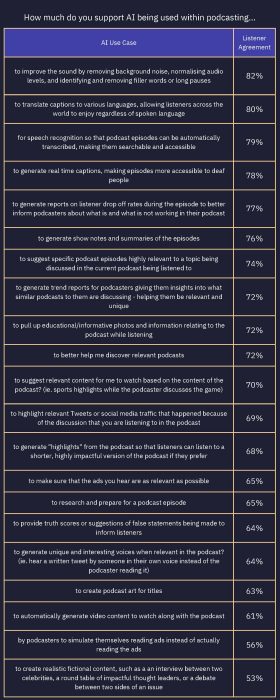If you are having reservations about using AI in your podcast creation, don’t. A new Acast survey indicates that listeners are supportive of this new technology towards making content more accessible and a better listening experience.
Key points:
-82% support to improve sound quality
-80% embrace translation technology to defy language barriers
-65% approve of advertisers leveraging AI to serve relevant ad content
-Nearly three-quarters approve of AI to suggest similar episode recommendations

Using AI for captions, show notes, searchability and tying topics to relevant adverting isn’t a new conversation but perhaps the buy in of listeners to the ways AI can better serve them, without losing human aspects of the conversation is.
I have a few personal take aways from this for podcasters who might be using AI without the final edit and tweak at the end.
I used a transcribe function towards a recent podcast where I referenced the traditional custodians of the land that I walk upon, the Ngunnawal people.
If I were to send Ngunnawal off to be voiced by someone like Abe’s Audio, I would of course include an audio pronunciation, which phonetically is, “none-o-wall”.
This word was quite beyond my transcriber’s capabilities and it came back with,
“I acknowledge the traditional owners of the land and none of the people.”
I also did an interview with a woman who must have had a similar cadence to me. Poor old AI kept getting confused with who was talking. Fixing who said what was not as easy as it sounds as the technology kept creating a “third person” when I would try to separate the speaking parts into who they belonged to.
Proof reading and editing such a transcription can take hours.
I also read through a friend’s AI constructed show notes where they had the American spelling of organization left in. Perhaps not everyone is a stickler for local product, local spelling, but my eyes linger when someone doesn’t realize they’ve used the wrong color.
Then there are names, titles, pronouns and roles.
My podcast TACT’s show note creation turned one of my guests into a Dr, who wasn’t.
ChatGPT may select an outdated job role.
And, if you truly mean to deliver an inclusive product, if your guest gives their pronouns as they/them, then you need to go through with a fine-tooth comb to change any differing gender specifying language.
I love the time saving capabilities of AI, and the ease and accessibility it can deliver. But you know your product and people best. I’d always factor in proof reading, fact checking and editing time additional with any AI elements you embrace in your audio creation.



I concur with the author of this article to proof read and proof listen all output produced by automated tools and that includes chatGPT.
From my experience of using chatGPT, I entered a law essay question which I completed over 10 years ago (2010) into chatGPT.
My original essay was awarded an HD. But the answer produced by chatGPT would have been awarded a FAIL!
The result produced irrelevant information and no references.
Even if I prompted chatGPT to place references in the answer, the answer would still have been irrelevant and awarded a FAIL!
Could you imagine students slacking off and submitting their essay for marking and the marker whether a teacher or lecturer reading identical answers!
In conclusion don't rely on output from bots without proof reading and proof listening and tweak the desired output by contributing your own intellect to the problem to be solved.
AI bots may well improve productvity but use it judiciously.
Thank you,
Anthony, use your God-given mind, Strathfield South, in the land of the Wangal and Darug Peoples of the Eora Nation